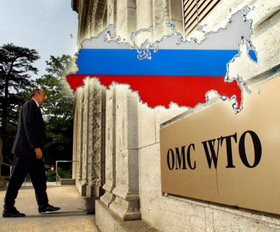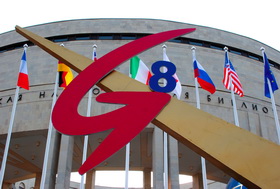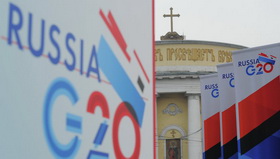Trying out the Instruments of Global Governance
In
Login if you are already registered
(no votes) |
(0 votes) |
Doctor of Political Science, Professor, Head of the World Politics Department of the Higher School of Economics
The economic leverage and methods for establishing new political and economic regimes (Eurasian Union) are being used by Russia even more actively in the post-Soviet space. Economic interests and economic instruments to promote its political interests are becoming an increasingly important element of Russian foreign policy. Its economization is taking place and methods of influence associated with instruments of global governance are being explored.
By restoring its economic and financial potential since 2000, Russia has begun to move away from a passive, reflexive position with respect to the economic and financial realities and institutions of the international community. Initially, it tried to use these rules to further its political interests, but later called into question some of them and took upon itself to coordinate actions among the growing economies (BRICS) dissatisfied with these rules. The economic leverage and methods for establishing new political and economic regimes (Eurasian Union) are being used by Russia even more actively in the post-Soviet space. Economic interests and economic instruments to promote its political interests are becoming an increasingly important element of Russian foreign policy. Its economization is taking place and methods of influence associated with instruments of global governance are being explored.
With the emergence of the Russian Federation as an international actor in 1991, against the backdrop of a transformation in social systems, the content and forms of Russia’s foreign policy have been and continue to be changed substantially. It is not only a matter of targeting, or even of changes to the system of alliances and its foreign policy goals, but primarily relates to the interests that Russian foreign policy is serving and the understanding of its political objectives.
Since 1992, Russian foreign policy has increasingly opted towards serving the overall economic interests of the country and individual groups of interests and classes as they used to be called in the past. Russian policies have not become fully liberal: enforcement methods and political interests continue to occupy a significant position, but the economic component is growing stronger and further economization is occurring. The first stage of economization that happened in the 1990s, including the currency and financial crisis of 1998, can be characterized as addressing the task of Russia’s inclusion in the global financial and trade systems on subordinated terms as well as the country’s adaptation to international rules. At that time, Russian foreign policy mostly worked toward the mitigation of domestic systemic crises and had no resources to pursue serious geopolitical goals.
The second stage in the 2000s saw efforts to facilitate the growing export of capital from Russia, as well as attempts to use these exports and the growing economic and financial strength of the country to achieve foreign policy goals. This period covers the selective economic assistance by Russia to potential foreign policy partners, writing-off of foreign debts for political purposes, attempts to introduce trade sanctions against opponents, efforts to promote domestic companies within strategic positions abroad, initiatives to change the rules of the game of the organization of the global currency and financial systems, etc. Ideas were emerging and disappearing regarding how to subordinate foreign policy to the goals of economic and political modernization of the country. Foreign policies began to apply the instruments that are now associated with the concept of ‘global governance’, which is not quite correct. A case in point are the attempts to address political tasks through economic methods, as well as by establishing local political and economic regimes, rules and regional economic associations.
At present, the period of adaptation of Russia and its foreign policy to the realities of the rest of the world is over. Russia has joined the WTO, and aren’t any ambiguities or misunderstandings left with the leading countries of the world regarding existing political and economic differences. What’s next? What will the place of economic interests in Russian foreign policy be and will foreign economic policy serve Russia’s political interests?
Economic benefits and the foreign policy of Russia
It appears that its economic interests will occupy an increasingly important place among the objectives of Russia’s foreign policy. This follows from the main foreign policy document – Concepts of the foreign policy of the Russian Federation – and the same conclusion is also supported by the agenda of the most important international forums – the G-20 and G-8. The website of the Russian MFA has expanded the section on “Economic Diplomacy”, and the Government and business associations are establishing mechanisms of internal approval and coordination for pursuing the economic and political interests of Russia and the rest of the world. Both the political leadership and business community are giving sufficient attention to this objective.
However, there is another side to the process of foreign policy economization that also deserves attention. This relates to the construction of a system of economic instruments to be used by foreign policy for achieving political goals. Examples include tariff policy, exchange rate policy of the Central Bank, the introduction of import limitations on various goods, issuance of licenses to foreign companies, and lending to other states; all these measures should not only be oriented towards considerations of economic rationality, but also targeted at achieving geopolitical benefits for the Russian state.
A skillful use of economic instruments of foreign policy along with other means and tools help make the pursuit of foreign policy objectives substantially more efficient. Taking into account the limitations imposed by the international law over the use of force in foreign policy, its economization along with diplomatic efforts and cultural and legal influence comes to the fore in the foreign political repertoire of Russia.
The introduction of economic instruments in the practice of foreign policy for political objectives allows it to make foreign policy more flexible, efficient and inexpensive, to avoid violating the principles of international law, and to more easily ensure support for Russian policies by the international community. The economization of foreign policy offers powerful leverage that makes it possible to influence the development of the long-term position of Russia’s foreign political partners by promoting economic interests both among these partner states in general and among influential economic interest groups within these countries.
Instruments of global governance at Russia’s disposal

As a result of sanctions applied by Russia,
Georgian exports to Russia decreased from
$ 154.5 million in 2005 to $ 75.6 million in 2006
Russia, as a major, influential and rich country, can utilize a combination of information, diplomatic, enforcement and economic instruments in its foreign policy. The latter category of tools to a large degree deserves particular attention, since economic instruments are highly efficient, do not violate international law, and are quite acceptable politically. The foreign policy economic toolkit of global governance includes incentives for international trade, the use of economic sanctions, foreign debt, foreign direct investment, the establishment of regional economic blocs and regimes, regulation of international financial flows, provision of economic and humanitarian assistance, manual control of the activities of international financial institutions, and the commercial expansion of national businesses in the interest of Russian foreign policy.
Only major economies that rank high in the world and regional trade can afford the use of such instruments. Russia, which occupies rather strong positions in global trade and financial transactions, numbers among these countries as well.
A distinction should be made between the economic instruments of foreign policy and the foreign economic policy of a state. There is a significant difference between them: the economic tools of foreign policy use economic methods to achieve non-economic goals, whilst the foreign economic policy uses economic and non-economic instruments to achieve the economic goals of the state. In order to increase the efficiency of Russia’s foreign policy, a key factor concerns the subordination of foreign economic measures to political objectives, the establishment of political benchmarks, and the development of a system to coordinate the political and economic interests of the country.
To date, economic instruments in the practice of Russian foreign policy have been used unsystematically or ineffectively, and the political results of their application has been minor or in some instances – negative.
Russian Experience in Applying Instruments: ‘The First Pancakes Came Out Lumpy’
The effective use of economic instruments in the interest of Russian foreign policy has been prevented mainly by subjective factors: 1) the lack of understanding of the place and role of these instruments in the foreign political arsenal of the state; 2) the lack of a mechanism for elaborating and implementing decisions on the use of economic measures in the interest of foreign policy; 3) the lack of a mechanism for the internal approval and coordination of adopted measures among the Presidential Administration, MFA, Ministry of Economic Development, Ministry of Finance, Central Bank, Federal Migration Service and Federal Consumer Protection and Welfare Oversight Service.
The first results of using such instruments cannot be called a success. A vivid example in this regard is the untoward application of trade and economic sanctions against Moldova and Georgia, introduced by Russia on 27 March, 2006. The Russian side made it clear that products from these countries were not consistent with sanitary safety rules. As a result of sanctions applied by Russia, the total export volume of Moldavian wine products dropped by 46.5% in 2006 against the previous years, and, in terms of prices did not exceed $136.4 million. The losses of Moldavian companies totaled approximately $180 million. Georgian exports to Russia decreased from $ 154.5 million in 2005 to $ 75.6 million in 2006.
Through its actions, Russia seriously “punished” the economies of the two countries for the behavior of their politicians unacceptable to Russia. However, did Russia manage to attain its own political goals?
In the case of Moldova, pressure by Moscow led to certain shifts in the policy of that country, that were later annulled however by the results of Parliamentary elections in 2009. In the case of Georgia, Russia’s actions failed to achieve any changes in Tbilisi’s policies, and the crisis in the relations of the two countries resulted in military confrontation in 2008.
The poor political performance of Russian trade sanctions against Moldova and Georgia was preconditioned by several factors.
First, the goals of Russia’s foreign policy were not clearly defined and were not correlated in any way with the political potential of such an instrument as trade sanctions. If by its refusal to buy Moldavian and Georgian wine, Moscow hoped to compel these countries to accept an absolutely unacceptable compromise of principles regarding their territorial integrity, then such a plan was doomed from the outset.
Second, Russia did not succeed or even attempt to create a broad international coalition in support of its sanctions, while in the absence of a coalition the sanctions became “leaky” and the international community stood up for the victims. The term “sanctions” originates from the Latin word “sanctus” and implies the pursuit of certain noble goals, especially, as the approach is perceived by Europeans. Russia’s trade sanctions should have been incorporated into a wider international campaign and empowered by moral justifications understandable to the international community. As a rule, instances of human rights violations, manifestations of external aggression, and attempts to acquire weapons of mass destruction have become used as justifications in international practice.
Third, the method chosen by Russia to apply trade sanctions is questionable. Presumably, the foreign policy of a major power should clearly state its goals without hiding behind the decisions of sanitary authorities. The references to sanitary norms that are applied rather selectively do not trick anybody and play to the disadvantage of the Russian Federation. Besides, the sanctions by Moscow did not receive required informational and publicity support. As a result, the international community interpreted them as yet another proof of “Russian imperial ambitions”, as an example of unjustifiable pressure on sovereign states, and as evidence of incoherence and immaturity in Russian foreign policy.
Finally, it should be noted that as a result of these trade wars Moldova and Georgia were not the only ones to incur losses in terms of customs duties and taxes not collected into their budgets. Russia also lost a part of revenues from import taxation and abandoned major suppliers of wine products.
The Need to Develop a System
In order to strengthen Russia’s foreign policy inventory on the basis of its economic strength, it would be enough to draw up a procedure (or order of business) for adopting politico-economic decisions, as well as an algorithm to coordinate the activities of ministries and agencies and to designate a coordinating authority. It is necessary to work out the methodology for using trade and economic instruments and to reach an understanding regarding their potential application under the circumstances of Russia’s membership in the WTO.
All this will open up opportunities for developing a less expensive – unlike the current one – mechanism for Russia’s political influence in the post-Soviet space and the rest of the world through its economic presence. In the mid-term, it is be necessary to develop and implement a program to make Russia’s priority countries and their influential economic interest groups more dependent on the economic instruments of the foreign policy of the Russian state.
In the absence of efforts to enhance the efficiency of its foreign policy economic instruments, Russia will be compelled to increasingly rely on enforcement methods in defending its foreign political interests. In the first place, this pertains to the strengthening of the economic presence of China (in Central Asia) and Europe (in the western part of the CIS). However at present, force cannot be considered a routine method of addressing foreign political problems, many of which could be solved by the use of economic sanctions, the establishment of regional economic associations, and the regulation of foreigners’ access to domestic markets. Economic instruments, as compared to enforcement methods, are less expensive and more acceptable from a political and humanitarian standpoint, and quite often are more effective.
Russia’s foreign policy must draw conclusions from its setbacks in the past. Russia can incorporate into its foreign policy such methods as sovereign lending, development assistance, regulation of access to its financial markets, etc. Some of these instruments might serve as a “stick”, such as by the foreign political objectives of the country being achieved by exerting pressure or threatening another state with financial and economic methods. Another set of foreign policy economic instruments represents a sort of a “carrot” that offers incentives to a foreign country so as to make it change its policy in a certain way.
There is a rather high potential for the use of economic instruments in Russian foreign policy. The task is to develop an efficient foreign political mechanism for the use of these instruments. With the emergence of such a mechanism Russia will be able to address many emerging issues of partial adjustment of the rules of the game, handling financial and trade preferences, setting up the rules, institutions and regimes, -- i.e. it will be able to accomplish what the “old” trade and financial nations have been doing for a long time and quite successfully.
Many Russian diplomats and policymakers have been and are proud that Russia doesn’t play these “backstage” mercantile games and that it acts ‘with its visor raised’. It seems that it is high time to learn how to play these games, and do them well – then Russian foreign policy will have more opportunities and options to respond to various challenges.
(no votes) |
(0 votes) |







